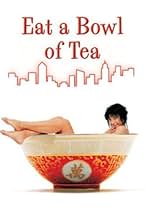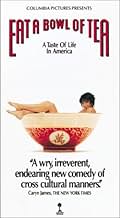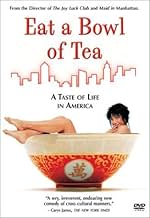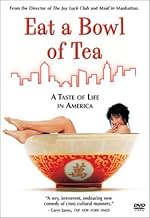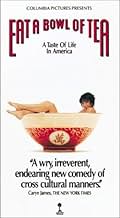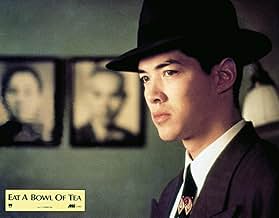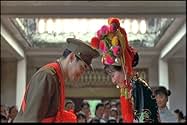Agrega una trama en tu idiomaA study in culture bridging, including ... a new US-born husband, trying to work within the traditional ways, a new China-born wife, eager to join the "dream" of America, two family-minded f... Leer todoA study in culture bridging, including ... a new US-born husband, trying to work within the traditional ways, a new China-born wife, eager to join the "dream" of America, two family-minded fathers, lots of gender-related social bifurcations.A study in culture bridging, including ... a new US-born husband, trying to work within the traditional ways, a new China-born wife, eager to join the "dream" of America, two family-minded fathers, lots of gender-related social bifurcations.
- Dirección
- Guionistas
- Elenco
Sau-Kei Lee
- Bok Fat
- (as Lee Sau Kee)
Siu-Ming Lau
- Lee Gong
- (as Lau Siu Ming)
Fan Hui
- Ben Loy's Mom
- (as Hui Fun)
Helena Law
- Aunt Gim
- (as Law Lan)
Yuen-Yee Ng
- Third Sister
- (as Ng Yurn Yee)
Ta Lei
- Movie Translator
- (as Lui Tat)
Eric Tsang
- Ah Song
- (as Eric Tsang Chi Wai)
Wai Wong
- Chuck Ting
- (as Wong Wai)
Yu-Yung Teng
- Fat Man
- (as Tang Shun Nin)
Michael Ming-Yang Lee
- Old Lum
- (as Michael Lee)
Wing-Tat Woo
- Sum Woo
- (as Woo Wang Tat)
- Dirección
- Guionistas
- Todo el elenco y el equipo
- Producción, taquilla y más en IMDbPro
Opiniones destacadas
in the times that every time you see new york now; woody Allen, Pollokaville, there are always scenes of the trade towers that are no longer with us, but although this film is situated in New Yoik, there are no scenes of the outside world. Why is this. and why do the Chinese suffer such great difficulties in New York. A film by wayne wang based on a book which was thought to be forgotten until the chinese literature came into a period of renaissance in the 1970s, Wayne wang named after the actor John Wayne, ironically this wasn't even his real name, it was something like marilyn, so either or, Wayne Wang was always going to be called after an American icon, much to his parents desire. The film juxtaposes culture; chinese onto the new setting; New York. it does this with a relationship at the centre and the chinese culture surrounding this relationship. For the chinese in this film; mostly men, as they have moved to New york to send back money to china, a woman is seen as a much needed asset, an asset that enables the continuing of their culture and their family in their new found land. the woman, has this pressure put upon her and so does the man, ben loi, the man impotent, and the woman cuckolds him to make the rest of the family happy, This film is a great insight into the Chinese and the idea of an alien in a foreign country, both with ben loi going back to china to marry and his wife to be coming over to America, Was it sting wha sang WOOOaaah I'm an alien, I'm a little alien, i'm an englishman in New York.
I recommend also Do the Right thing by Spike Lee
I recommend also Do the Right thing by Spike Lee
A few years after WWII, a young Asian-American man who served his country is sent off to China by his father in the hopes of bringing back a bride. His mother and extended family are still over there, having been separated for decades because of the Chinese Exclusion Act. He's introduced to a young woman, they marry, and then return to America.
The films strengths are in its representation. We see Asian-Americans as real people here, with different personalities, multi-lingual, and having the same problems anyone else has. They have a tightknit community, but are patriotic and assimilated, particularly the younger generation. The stress on the young couple is both cultural (the pressure to produce kids, the lack of privacy) as well as universal (work stress leading to problems in the bedroom, spending too much time in front of the TV, and infidelity). The story went to places I really did not expect it to go, touching on comedy, romance, and drama, and I liked that. I also liked the visibility on the Exclusion Act, which serves as a backdrop to the story, and other little elements, including the reference to Japanese internment when the Korean War starts brewing (fearing it may happen to them), as well as the guy being bruised up after being in police custody.
Undermining all this is the film's acting, which let's just say didn't deserve any awards, as cute as the lead couple are (Cora Miao and Russell Wong). There are a few good moments from one of the old fathers (Victor Wong), but mostly it seemed staged and with poor performances, giving the film a rather lightweight feel. The film tips its hat to both Lost Horizon (1937) and The Lady From Shanghai (1947) which was a lovely touch, but just doesn't conjure up the depth of emotion of the scenes from those films. It kept me engaged from beginning to end though, and director Wayne Wang moved things along nicely. I'm glad I saw it, and think it's worth checking out.
The films strengths are in its representation. We see Asian-Americans as real people here, with different personalities, multi-lingual, and having the same problems anyone else has. They have a tightknit community, but are patriotic and assimilated, particularly the younger generation. The stress on the young couple is both cultural (the pressure to produce kids, the lack of privacy) as well as universal (work stress leading to problems in the bedroom, spending too much time in front of the TV, and infidelity). The story went to places I really did not expect it to go, touching on comedy, romance, and drama, and I liked that. I also liked the visibility on the Exclusion Act, which serves as a backdrop to the story, and other little elements, including the reference to Japanese internment when the Korean War starts brewing (fearing it may happen to them), as well as the guy being bruised up after being in police custody.
Undermining all this is the film's acting, which let's just say didn't deserve any awards, as cute as the lead couple are (Cora Miao and Russell Wong). There are a few good moments from one of the old fathers (Victor Wong), but mostly it seemed staged and with poor performances, giving the film a rather lightweight feel. The film tips its hat to both Lost Horizon (1937) and The Lady From Shanghai (1947) which was a lovely touch, but just doesn't conjure up the depth of emotion of the scenes from those films. It kept me engaged from beginning to end though, and director Wayne Wang moved things along nicely. I'm glad I saw it, and think it's worth checking out.
I remember seeing portions of this film shot at the now defunct and torn down San Francisco Studios. It was an interesting project that was one of many independent films being funded and shot at the time. My one anecdotal memory is seeing much of the crew and the studio employees being ushered out of the infamous Stage 2 (a warehouse like structure with little to no baffling, that served more as a storage area than an actual sound-stage) for the "love making" scenes. Seeing this film over a decade later I can't really understand what all the hub-bub was about ... unless the actors were nude underneath the sheets or something. In any event the bedroom scenes were shot sans an audience.
Oh well.
It's a nice little film that, for some reason, is labeled by Blockbuster Video as a "comedy." Certainly there're a couple of humorous moments, but once again the marketing types pull a bait-and-switch on this customer by labeling a light drama a comedy. This is NOT a comedy. However it does raise a smile here and there, and occasionally a chuckle, and, in spite of the intentional mis-labeling, it is a very good film.
The script moves along well enough. There's a fine story here, but the film's title, for myself, is a missed opportunity. And, unlike in other films, the cultural and generational gaps aren't played up to the hilt. That's a definite plus for this movie. Quality over quantity is given a premium in this movie. Yet at the same time the "message" and title of the film is almost too subtle to grasp, and is only made openly manifest in the final scenes. Even then you have to be somewhat on your toes to catch it.
It's a likable film. The lighting is nicely done, and was the foremost technical aspect that I noticed in this film. The cinematography is intimate and very straightforward. The acting is very fine; no over the top performances, nor understated moments; all characters are given appropriate exposure, and state their messages with emotional clarity.
The film is somewhat slow, but not overly, as is Wayne Wang's style. Overall a well stated film regarding Chinese-American society (specifically a newly wed couple, circa post WW2). It's by no means a gut-busting comedy, though there are comic moments in it. If you're expecting lots of laughs, then don't see this film. If you're expecting some mildly humorous situations told in a dramatic vein, then this film will probably entertain :)
Enjoy!
Oh well.
It's a nice little film that, for some reason, is labeled by Blockbuster Video as a "comedy." Certainly there're a couple of humorous moments, but once again the marketing types pull a bait-and-switch on this customer by labeling a light drama a comedy. This is NOT a comedy. However it does raise a smile here and there, and occasionally a chuckle, and, in spite of the intentional mis-labeling, it is a very good film.
The script moves along well enough. There's a fine story here, but the film's title, for myself, is a missed opportunity. And, unlike in other films, the cultural and generational gaps aren't played up to the hilt. That's a definite plus for this movie. Quality over quantity is given a premium in this movie. Yet at the same time the "message" and title of the film is almost too subtle to grasp, and is only made openly manifest in the final scenes. Even then you have to be somewhat on your toes to catch it.
It's a likable film. The lighting is nicely done, and was the foremost technical aspect that I noticed in this film. The cinematography is intimate and very straightforward. The acting is very fine; no over the top performances, nor understated moments; all characters are given appropriate exposure, and state their messages with emotional clarity.
The film is somewhat slow, but not overly, as is Wayne Wang's style. Overall a well stated film regarding Chinese-American society (specifically a newly wed couple, circa post WW2). It's by no means a gut-busting comedy, though there are comic moments in it. If you're expecting lots of laughs, then don't see this film. If you're expecting some mildly humorous situations told in a dramatic vein, then this film will probably entertain :)
Enjoy!
Ignore the picture that was used as the poster of this film, it is completely incongruous to the story. This is a film set in New York's Chinatown about a couple, one an Americanized Chinese young man (Ben Loy) who agrees to marry a young lady (Mei Oi) from a small village in China. She comes to New York and the story is the struggle of their compatibility. The movie is set in the late 1940's/early 1950's and it has a good rhythm to it. Most of it is in English, but that doesn't matter. At times you feel like a voyeur, looking in on this couple and wondering what will happen next to them. They do have their problems, and she even takes on a lover (Eric Tsang, who has a smallish but pivotal part), but the story is about the clash between Chinese traditions and their present day. While the film is good, it partly suffers from melodramatic overload. If you're interested in seeing a film about the immigrant experience, this is a good one about the Chinese one. I saw it on TCM in the wee hours of the morning. I watched it through, so that in and of itself is an endorsement.
This is not a great movie, but is still quite good. The story involves Chinese men who suddenly have the chance to marry. Up until then, US immigration quotas separated families in an effort to limit an influx of the Chinese. They did so by allowing MEN into the country but not women! The movie moves at a nice leisurely pace and I had no serious complaints. It's just that there are better stories about the clash between traditional and modern Chinese culture (such as in Eat, Drink, Man, Woman). Still, considering how few movies about Chinese or Chinese-Americans exist, this pretty makes this movie a must-see for the curious viewer.
¿Sabías que…?
- TriviaMuch of the picture was filmed in Hong Kong including interiors and ones set in Chinatown in New York City.
- ConexionesFeatured in The Slanted Screen (2006)
Selecciones populares
Inicia sesión para calificar y agrega a la lista de videos para obtener recomendaciones personalizadas
- How long is Eat a Bowl of Tea?Con tecnología de Alexa
Detalles
Taquilla
- Total en EE. UU. y Canadá
- USD 231,423
Contribuir a esta página
Sugiere una edición o agrega el contenido que falta


